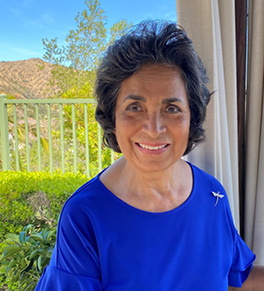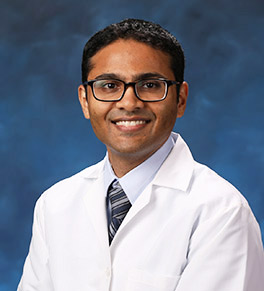Patient transforms lifestyle, reduces stroke risk

When Elsa Ruiz awoke on Dec. 13, 2017, she noticed that her vision was blurred. Initially, she thought it was the ash she’d cleaned off her barbecue the night before, deposited there by the devastating wildfires raging in Corona at the time.
She went to work at her family’s window-covering business in Anaheim Hills and tried to ignore her vision problem.
At her sister's suggestion, she checked her blood pressure and was alarmed to see that her systolic level had soared to 210, well past the 180 danger zone that should trigger immediate medical care.
‘Go to UCI Health’
“I planned to test it again in an hour but I got busy,” Ruiz says. “When my husband checked on me at noon, like he always does, he called my daughter, who is a pediatrician. She told me to go to UCI Health immediately.”
The UCI Health Comprehensive Stroke & Cerebrovascular Center, Orange County's first Joint Commission-certified comprehensive stroke center, provides the leading edge treatment and care stroke patients need to have the best outcomes and recovery.
There, Dr. Jay Shah, a UCI Health vascular neurologist and stroke specialist, told the 62-year-old Ruiz that during her sleep she’d suffered a stroke on the right side of her brain where the optic nerve resides. Further tests revealed that she’d had four previous strokes without noticing any symptoms.
“I was shocked because I'd always been so healthy,” Ruiz says. But she had gained weight over the year and had been stressed by family issues, all while wildfires were ravaging local hillsides.
“It was one thing right after another,” she recalls. “Maybe my body just couldn’t handle it.”
New diagnoses, new meds
Ruiz left the hospital with new diagnoses of high blood pressure, high cholesterol and diabetes. She was sent home with eight new medications, in addition to insulin she was required to inject four times a day.
Soon after, she saw her community primary care doctor, who is also a diabetes specialist. He immediately stopped the insulin and started her on dulaglutide, a type 2 diabetes medication that helps the body release its own insulin and improve blood sugar levels when combined with nutrition and exercise.
At her follow-up visit with Shah in January 2018, he encouraged Ruiz to make lifestyle changes that would prevent future strokes. Up to 90% of strokes can be prevented by controlling such risk factors as high blood pressure, elevated cholesterol levels and diabetes, Shah says. Diet and exercise play a role, too.
“He told me to change my eating habits and to exercise,” she recalls, “and that I could return to work when my body and my test results said I was OK.”
Motivated to change
Ruiz took Shah’s recommendations to heart.
She started by walking 15 minutes a day; it was all she could manage at first. She increased the time by 15 minutes each week until she could walk for two hours. Today, she strides up and down the hills in her neighborhood, clocking four miles a day.
She switched from tortillas, tacos, enchiladas and meat to eating vegetables and just a little bit of chicken. She also quit processed foods.
“It worked. I went back to see Dr. Shah three months later and I’d lost 25 pounds!” says Ruiz. “Now, if I can have beans and salsa, I’m happy.”
The medications — some of which made her feel agitated — were another hurdle. Again, Shah stepped in and recommended meditation classes at UCI Health which really helped.
'A much better life'
As of spring 2021, Ruiz has lost a total of 70 pounds, walks four miles each day and makes healthy food for herself and her family. She started Zumba classes before the pandemic and her instructor has continued them via Zoom, adding toning sessions three times a week.
“At the beginning it was hard, but I stuck to the plan,” Ruiz says. “I discovered that I’m very strong. If I have something in my mind, I won’t change. And I have a much better life than I did three years ago.”
Her eyesight continues to be blurry because of the stroke, which makes her work as an accountant challenging at times. “It’s a miracle I have my vision,” she says. “The doctors told me that most people who have my kind of stroke are either blind or dead, so I count my blessings.”
Shah, an assistant professor of neurology at the UCI School of Medicine, referred her to UCI Health neuro-ophthalmologist Dr. R. Wade Crow at the Gavin Herbert Eye Institute. He discovered that Ruiz also had cataracts and sent her to cornea specialist Dr. Matthew W. Wade, who removed them in November 2020.
“My vision improved so much from that surgery,” she says. “I still need to wear glasses for reading and computer work, but my distance vision is now 20/20. I love my walks in nature and my plants and I can see all the little details again.”
The power of lifestyle changes
“Dr. Shah is a caring soul, and I always feel treated like a person,” Ruiz says. “You know what I told him? ‘You’re one of my angels.’ My life has changed completely.”
Within six months of her stroke, Ruiz had reversed her diabetes. She still takes blood thinners and medication for high blood pressure and cholesterol, but the dosages are all greatly reduced.
“Elsa is a shining example of the powerful effect that simple lifestyle changes can have,” Shah says. “She not only drastically decreased her risk of stroke, she also reduced the amount of medicine she needed to take.”
Ruiz believes she was given a second chance in order to help others. Before the pandemic, she shared her story at a seminar hosted by her primary care physician. Cooking is one of her passions and when things return to normal, she plans to teach people to make healthy meals in his kitchen classroom.
“I hope my story helps other people — to show them that they're not alone, that they can do this like I did,” she says. “I’m not special. I was fortunate to be surrounded by good and knowledgeable professionals on my journey at UCI Health. And I’m so very grateful.”





